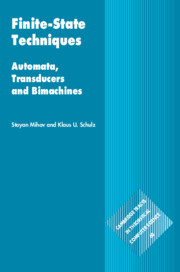
-
Select format
-
- Publisher:
- Cambridge University Press
- Publication date:
- 29 July 2019
- 01 August 2019
- ISBN:
- 9781108756945
- 9781108485418
- Dimensions:
- (228 x 152 mm)
- Weight & Pages:
- 0.57kg, 314 Pages
- Dimensions:
- Weight & Pages:
You may already have access via personal or institutional login
Book description
Finite-state methods are the most efficient mechanisms for analysing textual and symbolic data, providing elegant solutions for an immense number of practical problems in computational linguistics and computer science. This book for graduate students and researchers gives a complete coverage of the field, starting from a conceptual introduction and building to advanced topics and applications. The central finite-state technologies are introduced with mathematical rigour, ranging from simple finite-state automata to transducers and bimachines as 'input-output' devices. Special attention is given to the rich possibilities of simplifying, transforming and combining finite-state devices. All algorithms presented are accompanied by full correctness proofs and executable source code in a new programming language, C(M), which focuses on transparency of steps and simplicity of code. Thus, by enabling readers to obtain a deep formal understanding of the subject and to put finite-state methods to real use, this book closes the gap between theory and practice.
Reviews
‘… this volume is well written and very detailed. It is thus a nice reference for those results for the interested graduate or researcher …’
Andreas Maletti Source: ZB Math Reviews
Contents
Metrics
Full text views
Full text views help Loading metrics...
Loading metrics...
* Views captured on Cambridge Core between #date#. This data will be updated every 24 hours.
Usage data cannot currently be displayed.
Accessibility standard: Unknown
Why this information is here
This section outlines the accessibility features of this content - including support for screen readers, full keyboard navigation and high-contrast display options. This may not be relevant for you.
Accessibility Information
Accessibility compliance for the PDF of this book is currently unknown and may be updated in the future.


